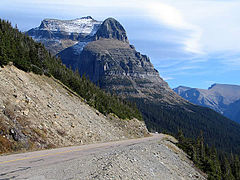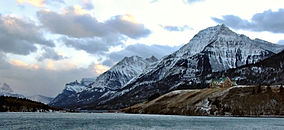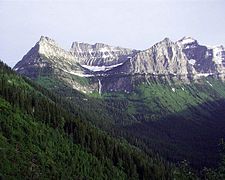 Some years ago, probably longer ago than my mind can conjure, I was asked to lead a clergy retreat for the Rocky Mountain Annual Conference of the United Methodist Church. It was not the first or last of such invitations for me, but it was one of the few I received from the Western Jurisdiction of the church. It was held in Missoula, MT, and I had a lovely time. The temperature was still cool in early May, and the preachers were eager and lively participants.
Some years ago, probably longer ago than my mind can conjure, I was asked to lead a clergy retreat for the Rocky Mountain Annual Conference of the United Methodist Church. It was not the first or last of such invitations for me, but it was one of the few I received from the Western Jurisdiction of the church. It was held in Missoula, MT, and I had a lovely time. The temperature was still cool in early May, and the preachers were eager and lively participants.
But the retreat itself is not the subject of my essay today. I wish to speak of a day or two prior to the event where I drove to Glacier National Park and spent the night at Waterton Lakes National Park in Canada, connected to Glacier by a series of spectacular waterways. Driving north from Missoula had its own kind of uniqueness, since there are NO speed limits on Montana highways—none. One can drive as fast as one can stand. At that time I lived in Texas, and knew at least something about fast driving. We have roads where the speed limit is 80, but that remains merely a suggestion for the feint of heart, if you know what I mean. But nowhere in Texas can one find no speed limits at all—at least officially. But in Montana, on the interstate highways, fast driving is de rigeur. I cannot ever remember being passed by every 18-wheel vehicle on the road, and I was doing about 90 in my rather heavy-engine rental car. The journey from Missoula to the entrance of Glacier was certainly quicker than any projected mileage chart suggested.
The park was not yet officially open; I missed that date by a week or so. Therefore the famous “Going to the Sun” road, the backbone of the park, allowed me to go only a few miles before the barriers stopped me cold. I could still see significant snow ahead on the road, so I was perfectly glad not to be able to proceed. I did, however, catch a glimpse or two of some of the glaciers that give the place its name. If you have not yet been to this northern national park and its rivers of ice, I urge you to do so ASAP. Without any doubt, and despite the dangerous fools currently running our national government, the climate IS warming, one of the results of which will be the disappearance of Glacier National Park. They will simply have to think of another name, because there will be no glaciers perhaps in as few as 50 years. This will be one of the tragedies of our unwillingness to face the reality of climate change, but a fairly benign tragedy compared with the millions of people who will need to find other places to live due to rising seas, the many animals that will become extinct, the blazing summers that will make significant portions of the globe uninhabitable.
 Having been stopped by the still snowed in main Glacier road, I headed further north to the Canadian border. After a brief chat with the border guard, who had little business this time of year, I went toward the Canadian Waterton Lakes. I had wanted to stay in the iconic lodge that sits right at the water’s edge, leading to what can only be described as a fjord (I have since been to Norway to see the real McCoy), a flat sheet of water that in season one can boat all the way down to Glacier Park. Unfortunately, like the Glacier main road, the fabulous lodge was still closed for the season. I was “forced” to stay in a small motel not far down the road but still within sight of the water.
Having been stopped by the still snowed in main Glacier road, I headed further north to the Canadian border. After a brief chat with the border guard, who had little business this time of year, I went toward the Canadian Waterton Lakes. I had wanted to stay in the iconic lodge that sits right at the water’s edge, leading to what can only be described as a fjord (I have since been to Norway to see the real McCoy), a flat sheet of water that in season one can boat all the way down to Glacier Park. Unfortunately, like the Glacier main road, the fabulous lodge was still closed for the season. I was “forced” to stay in a small motel not far down the road but still within sight of the water.
I drove into the motel lot, and a sight greeted me that I had never seen and have never seen since. Lying calmly and quietly all over the parking lot of the motel was a menagerie of mountain animals: mountain sheep and goats, moose, caribou, lambs, deer, among many others I could not identify. It was a scene right out of Isaiah 9, though I did not spy any wolves! It was as if Noah had just bumped up on Ararat and had disgorged a significant portion of his cargo onto the motel blacktop. I quickly turned off my car, stepped out among the zoo, and watched. The absolute silence was eerie and wonderful and awe-inspiring all at once. Not a single animal moved a muscle, though many of them took a long look at this two-footed intruder.
Then, very slowly and languorously, they began to move away, the huge moose, stretching his long neck and shaking his enormous head, the deer more quickly heading for their hills, the sheep and goats, rather more curious about the new stranger, but keeping a wary eye out just in case the newcomer might prove a danger to them. After some 15 minutes the parking lot was again a parking lot for cars rather than animals, and I parked accordingly. My overnight there was uneventful if inordinately quiet. It was cloudy, overcast, but the view down the fjord was magnificent, and I spent a long time drinking it in. In the morning, I hoped the lot would be animal inhabited again, but alas only a car or two greeted me. I needed to get back to Missoula to begin the retreat, and so I headed back south to the racetrack of the interstate.
As I said, the retreat was a good one, but nothing I said or anyone else could say would match the wonder of that Canadian parking lot and its collection of wondrous beasts. As we continue to warm our planet, we are rightly concerned with our fellow humans and just where they will find places to live. But we ought never forget the animals, God’s wonderful creations, and their spots on our globe. What will become of them, as fires consume their homes, as their vegetation is destroyed in heat and insect infestation? Will my grandchildren ever see what I saw, namely the glaciers of Glacier Park and the impromptu zoo on that Canadian parking lot? I wonder, and I dedicate my efforts anew to make both possible.
(Images from Wikimedia Commons)











